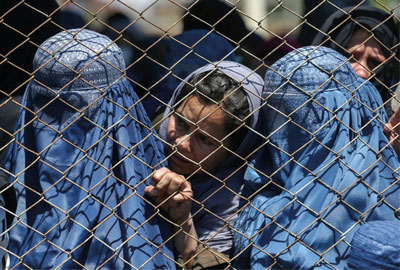Two women from different walks of life, one a rebel, the other a bureaucrat face an unknown future in Afghanistan.
One decided to work with the Taliban, the other is determined to fight them. Both vow they will never leave their homeland.
Karima Mayar Amiri, 54, heads a department in the Taliban-run Health Ministry. She is among the few women able to retain a leadership position in the new government’s bureaucracy and believes Afghans must be served no matter who is at the helm.
Many years her junior, Rishmin Juyunda, 26, could not disagree more. Afghan women will never be served with the Taliban in power, she says.
The rights activist is part of an underground network determined to fight harsh Taliban policies that restrict women’s freedom.
They represent a broad spectrum of women who have remained in Taliban-controlled Afghanistan after many fled, fearing a return to the brutal repression that marked the group’s previous rule in the late 1990s.
The international community has linked recognition of a Taliban government to factors such as guarantees for women’s rights.
It is not clear what rights women will be able to retain. Under the Taliban, women in most government ministries are now unable to work, teen-age girls are prohibited from going to school, the interim cabinet is comprised entirely of men. This deepens mistrust toward the Taliban.
But there are exceptions. Amiri, a mother of six, retained her senior position as the director of the ministry’s Quality and Safety Department after the collapse of the previous U.S.-backed government.
Her case is rare; most senior female bureaucrats have been barred from work across government portfolios except for health.
She is at the office by 9 a.m. to manage a team of five. Nearly every day she meets with her Taliban-appointed superiors to review action plans to combat the spread of diseases from the coronavirus to dengue fever.
“It was not a difficult decision for me to stay. I have my own department. If they request a plan, I will provide it. The Taliban leadership wants me to work for them, and I am ready,” she said.
“As long as I am healthy, I will work for them, for my people, my country.”
Juyunda is entering her last semester majoring in economics at Zahra University in Tehran. She chose to stay in the capital of Kabul and study remotely after the Taliban’s August takeover.
Textbooks crowd her worktable, but her focus is interrupted by a buzzing phone. In a string of WhatsApp messages, rights activists proposed slogans for the next demonstration.
Like many young women who grew up after the U.S. invasion in 2001, Juyunda’s dreams were dashed overnight after the Taliban seized Kabul and consolidated control of the country.
Many of her friends have left, unwilling to wait and see how the dust will settle following the dramatic U.S. exit.
She stayed. “I will never leave Afghanistan. I have to stay and make a change,” she said, her lively hazel eyes framed by a scarlet headscarf. The decision to remain came amid large-scale evacuations.
Between the Aug. 15 fall of Kabul and the final U.S. exit two weeks later, thousands of Afghans, including many women, rushed to the city’s airport in a desperate attempt to get out.










